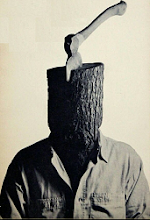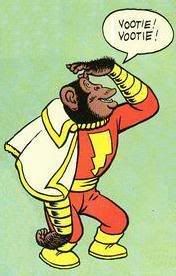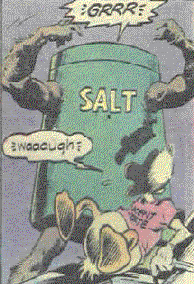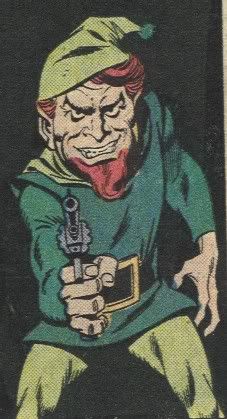Rising and Advancing: An Interview with Steve Englehart
 He has written for the mainstream comics scene for over thirty years, known for his character-defining runs on Captain America, Doctor Strange, the Avengers, Detective Comics, and many, many others. His work has ranged from small-scale pieces to vast cosmic epics and spanned several eras of comics.
He has written for the mainstream comics scene for over thirty years, known for his character-defining runs on Captain America, Doctor Strange, the Avengers, Detective Comics, and many, many others. His work has ranged from small-scale pieces to vast cosmic epics and spanned several eras of comics.His reputation has grown in recent years, with a number of his old comics being reprinted in trade paperbacks, new work published by the major publishers, and young writers citing him as a major influence.
Mr. Englehart agreed to answer a few of my questions about writing for the comics, providing Filing Cabinet of the Damned with a rare non-fictional interview.
Please note that all hyperlinks contained in the text were added by me to provide background information for readers, not included by Mr. Englehart himself.
----------------------------
HJ: What would you say is your particular strength in comic writing? What kind of story should have an editor think, “I need Steve Englehart for this?”
SE: My particular strength is getting to the heart of the characters and their lives, and finding new things in those lives. It usually plays out in resurrecting strips that have run out of gas.
HJ: Is there a central idea or theme that runs through your writing? If not through all of it, an idea or theme that you used for long stretches? If so, has your understanding or approach to the theme changed over the years?
SE: I think there are two things. (1) Peter Sanderson pointed out early on that one theme is "the rising and advancing of the spirit." I had put together the name Shang Chi to mean that and Peter saw (before I did) that it's pretty apt for what I do. My people always move forward - maybe not always rising if they're villains, but forward for sure. I don't sit on the status quo. (2) Above and beyond that, when I'm writing a character, I believe in that character - not in some weird, stalkerish way, but simply that I take him or her seriously, as someone I'm interested in and think you are, too. I don't write costumes.
HJ: If you could send your twenty-year old self a brief letter about the art and craft of writing, what would you say?

SE: "Come back when you can own your material." No, it's a tricky question. My twenty-year-old self played the game that existed, by the rules that existed, and loved pretty much every minute of it. It was a magickal time and there's never been as much freedom and creativity since. But the rules didn't allow you to become a millionaire from your creativity (see Kirby, Jack), and my current self looks back to see a lot of my creativity making money for other people, but not for me, which is no good.
As far as the "art and craft" goes - my technique in writing was always to push the limits, to go places no one had gone before (see Kirk, Captain), so any differences between then and now are the natural outgrowth of what I felt instinctively from the start. Rising and advancing...
HJ: Along the same lines, how would you say you’ve developed over the years? What would differentiate a Steve Englehart script from 2005 from a script you wrote in 1975, in terms of technique, style, and so forth?
SE: Just that I know more about the world now and can put that much more into the characters. Technically, I use less continuity now because it's fallen out of favor; I still keep it straight in my own head but don't assume the reader wants to follow it.
HJ: On your website, you make several references to a few of your stories being “the kind of cosmic epics that Marvel doesn’t know how to do anymore.” What is it that seperates a cosmic epic story from a regular comic story beyond the breadth of the playing field? What particular satisfactions do you think can be found in cosmic epics?

SE: I think the emphasis is on "epic," with "cosmic" as a type - i.e., epics don't have to be cosmic. But epics have to have a grand sweep, so as to justify a series of issues playing out a grand story with grand impact - and they have to have the series of individual stories where each story has its own meat. It's not news that the stuff I and others from the magickal time do has more meat than many current stories have, so many current epics have one idea (or less) stretched out over six issues. But an epic as I define it is a complex and solid experience, where you get to go on a ride for a number of months, and when you get to the end, you feel satisfied, not empty. Something real happened, and every step counted.
HJ: Your tenure on the Avengers introduced the character of Mantis, a character that even squeaked in a cameo in the Justice League of America (as “Willow”). You later revived Mantis from obscurity when you wrote Silver Surfer. What is it about Mantis in particular that intrigues you?
SE: She's also in SCORPIO ROSE as Lorelei.

I dunno, she was the first character I created who became huge, so I liked her anyway. Then, when I left Marvel to write The Batman and JLA, people were all over me about whether they'd ever see her again, and I came up with the idea of getting her into the JLA by the side door - then I decided to continue that in SCORPIO ROSE, and thought I might put her in everything I did thereafter - an idea that soon proved impractical. But when I came back to Marvel and did the Surfer, she fit right in, and she's remained a major character, so I was asked to come back a few years ago and straighten out the stuff that had been done to her in my absence. She's just likeable, different, and kicks butt - what else could you ask?
HJ: Interest in your work has resurged dramatically in the last few years. Not only are your older works being reissued in trade paperback (e.g., Avengers: Celestial Madonna, the Captain America Secret Empire series, etc.) but you were hired by DC to create a high-profile miniseries, Batman: Dark Detective. You were recently cited by Joe Casey, writer of the new series Gødland, as a huge influence. Why do you think interest in your work has grown recently?

SE: I think the stuff is solid, and it's always been solid - if it had my name on it, you could count on it (which is why I took my name off a few things over the years). I've got a certain level of craft and certain standards, and they're all pointed toward entertaining people as best I can every single time.
HJ: There are any number of ways to explore fresh ground with a character. What methods do you prefer? Are there angles that you find tend to be unexplored in most characters, angles that you find to be rich veins for storytelling usually left untapped by other writers?
SE: I have no set thing to look for. I generally just immerse myself in the existing stories, letting myself follow the character along, and in that process, I say "Why did this happen?" or "Why didn't this happen?" or "I would have gone there..." When I'm done, I have a clear feeling in my mind as to who the character is, and bits of business that I want to explore.
One thing I try hard to do is explore those things as if they grow naturally out of the storyline, rather than say "I'm here now, the old stuff sucked, now I'll fix it." I feel strongly that you have to respect everyone's contribution, at least to the extent of not dissing it in public - so if I try to fix something I believe went wrong, I try to provide a plausible explanation for that thing in my new story.
HJ: A typical fanboyish question I can’t help but ask: if your phone rang with the heads of Marvel and DC giving you carte blanche, what project would you take? A revival of Coyote? A relaunch of your ill-fated Big Town project, an idea that had tremendous promise? A return to Captain America or Green Lantern? A genre revival, like a western or space opera? Something wholly new?  (This question leaves aside issues of ownership. And we can also pretend that the “carte blanche” is serious, not something that would be yanked a week later. Yep, the question is purely theoretical, in a "controlling for gravity, I jump really high" sort of way.)
(This question leaves aside issues of ownership. And we can also pretend that the “carte blanche” is serious, not something that would be yanked a week later. Yep, the question is purely theoretical, in a "controlling for gravity, I jump really high" sort of way.)
SE: I really have no answer for this, because, as you say, it's a theoretical question - and therefore, I don't ever think along those lines. Last year everyone asked if I'd had a Batman sequel in mind, and the answer is, heck no. It seemed pretty clear that I'd never be asked to do one, so I never thought about things I could do. When they asked me, I got back into Bat-mode immediately, but Marvel and DC control their characters so I spend no time at all wishing I could do something I have no control over.
HJ: And the usual concluding question: what are you up to these days? Do you have any other writing projects in the works, comic-related or otherwise?
SE: I'm doing another DARK DETECTIVE run with Marshall [Rogers], Terry [Austin], and John [Workman] - a BLACK RIDER one-shot with Marshall - a JLA CLASSIFIED and JSA CLASSIFIED combo run with Tom Derenick and Mark Farmer - COYOTE TPBs, reprinting the classic COYOTE and SCORPIO ROSE stuff - and a novel for Tor called The Long Man.
------------------------
I’d like to thank Mr. Englehart for his generosity and his time. His work has provided the world with a great many entertaining comics, and dang it, the man should get his due.
Future interviews with other comic writers may be forthcoming, depending on my skills of persuasion and ability to formulate decent questions.





3 Comments:
Well done!
There are loads of comics creators who demand constant tribute and deference from their fans on message boards and at conventions...and while these people get the reputation of being arrogant and conceited, this perpetual need for external validation is actually a sign of their neurotic insecurity. I won't name names, but you can probably think of half a dozen without trying hard. By contrast, the great thing about Englehart is that his assessment of his own strengths as a writer is genuinely self-confident. I know this could very easily come across as an ironic way of calling him conceited...but honestly, I mean this as a compliment!
He knows what he can do as a writer, has demonstrated it time and time again, and seems very relaxed in saying "If you hire me to write a book, you'll get the best story possible about this character." And this is something fundamental a reader wants from any author -- not a desperate need to please, not angry defensive responses when a reader questions a story, but the simple statement: "You can relax and trust me as I take you on this journey, I won't let you down." If the writer feels that way about his or her own story it comes across to the audience, and that's precisely what Englehart has been doing for all these years.
By Anonymous, at 3:22 PM
Anonymous, at 3:22 PM
Great interview, Harvey. Englehart is one of my favorite writers, mainly for his Batman and Avengers stuff, but I'm just now becoming acquainted with his Dr. Strange work, which is the shee-ot thus far.
Too bad DC prematurely ended his Dark Detective series earlier this year (I read an interview with either him or Marshall Rogers that basically said they were working on the theory that they had 12 issues to play with, then found out halfway into it that they were only getting 6, which is why everything felt so rushed at the end.)
Anyhoo --- great interview again. More, please! (Do you take requests? David Michelinie or Len Kaminski would be great.)
By Chris, at 11:23 PM
Chris, at 11:23 PM
I liked your interview with Englehart. He's always been one of my favorite writers from the 70s. Captain America, Shang-Chi, Avengers vs Defenders, Batman--all great stuff!
By Anonymous, at 1:19 AM
Anonymous, at 1:19 AM
Post a Comment
<< Home